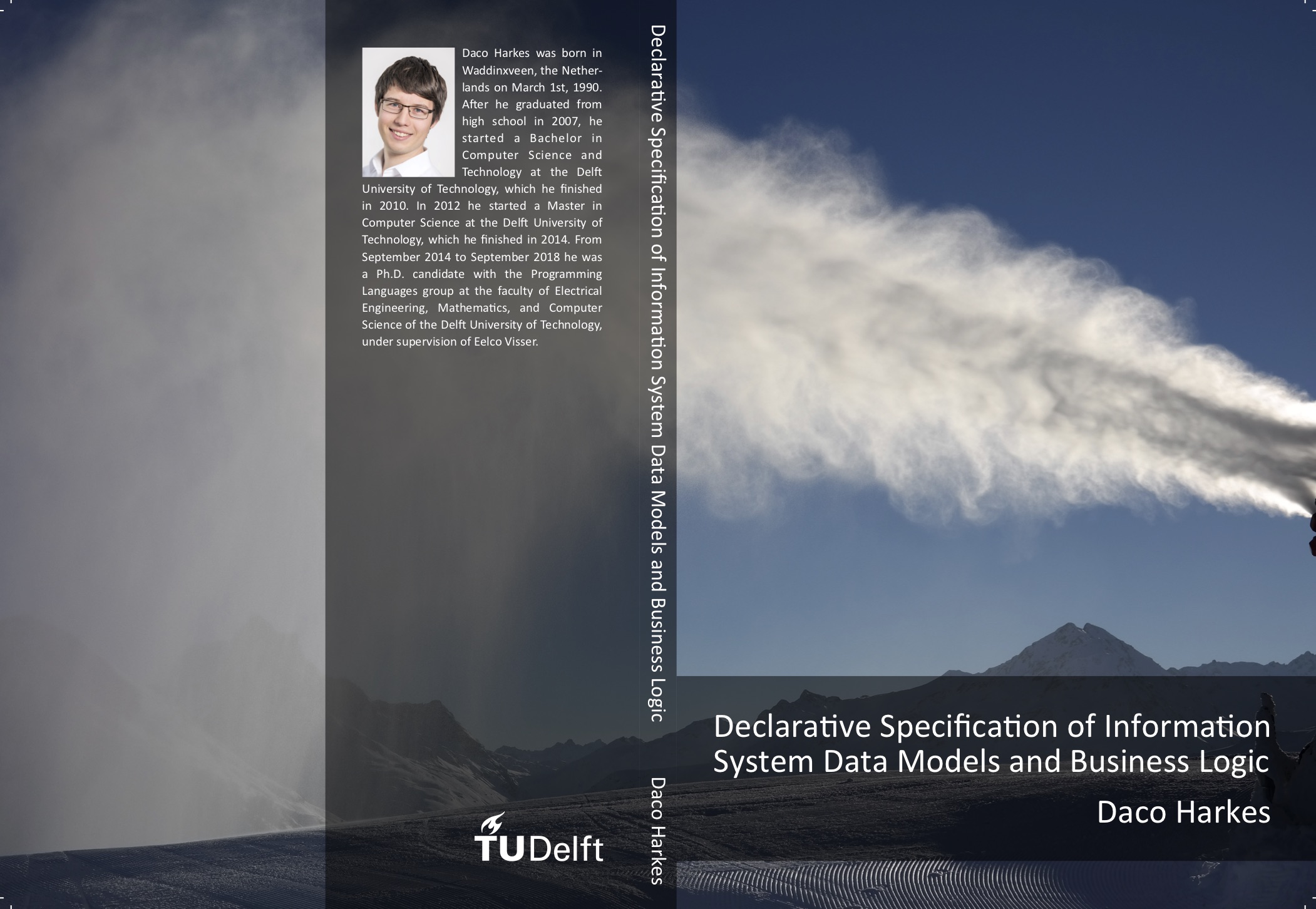Symposium Declarative Programming
Görel Hedin, Friedrich Steimann, Guido Salvaneschi, Hendrik van Antwerpen
Date: Tue, March 26, 2019
Time: 10:00
Room: EEMCS (building 36), Snijderszaal LB 01.010, Mekelweg 4, 2628 CD Delft
Note: The symposium is followed by lunch served in the room. Please register to attend by sending an email to R.Sharabi@tudelft.nl
On the occasion of the PhD defense of Daco Harkes, we are organizing a symposium on Declarative Programming with talks by Görel Hedin (Lund), Friedrich Steimann (Hagen), Guido Salvaneschi (Darmstadt), Hendrik van Antwerpen (Delft), followed by the defense itself.
Distributed system development with ScalaLoci
Guido Salvaneschi (TU Darmstadt)
Date: Tue, March 26, 2019
Room: EEMCS (building 36), Snijderszaal LB 01.010, Mekelweg 4, 2628 CD Delft
Distributed applications are traditionally developed as separate modules, often in different languages, which react to events, like user input, and in turn produce new events for the other modules. Separation into components requires time-consuming integration. Manual implementation of communication forces programmers to deal with low-level details. The combination of the two results in obscure distributed data flows scattered among multiple modules, hindering reasoning about the system as a whole.
[more]ACID for Programmers
Friedrich Steimann (FernUniversität in Hagen)
Date: Tue, March 26, 2019
Room: EEMCS (building 36), Snijderszaal LB 01.010, Mekelweg 4, 2628 CD Delft
Conventional collaboration among programmers relies on optimistic locking of files (through version control), perhaps enhanced with “soft” pessimistic locking via informal communication channels (e.g., by chatting things like “I will be working on file X for the rest of the day, so don’t you touch it”). Optimistic locking enables parallel work, at the price of manually merging competing edits (edit conflicts) at update or commit time. Merging edits is an unpopular and, in any case, error-prone task; yet, “hard” pessimistic locking of files does not appear to be a viable alternative.
[more]
Relations in JastAdd
Görel Hedin (Lund University)
Date: Tue, March 26, 2019
Room: EEMCS (building 36), Snijderszaal LB 01.010, Mekelweg 4, 2628 CD Delft
Part of the Symposium on Declarative Programming
[more]Towards Language-Parametric Semantic Editor Services based on Declarative Type System Specifications
Hendrik van Antwerpen (TU Delft)
Date: Tue, March 26, 2019
Room: EEMCS (building 36), Snijderszaal LB 01.010, Mekelweg 4, 2628 CD Delft
Editor services assist programmers to more effectively write and comprehend code. Implementing editor services correctly is not trivial. This paper focuses on the specification of semantics editor services, those that use the semantic model of a program. The specification of refactorings is a common subject of study, but many other semantics editor services have received little attention.
[more]
Declarative Specification of Information System Data Models and Business Logic
Daco Harkes (TU Delft, Google)
Date: Tue, March 26, 2019
Room: Aula Conference Centre (building 20), Mekelweg 5, 2628 CC Delft
Note: This is a PhD defense. The candidate's talk starts at 14:30.
Information systems are systems for the collection, organization, storage, and communication of information. Information systems aim to support operations, management and decision-making. In order to do this, these systems filter and process data according to business logic to create new data. Typically these information systems contain large amounts of data and receive frequent updates to this data. Over time requirements for information systems change, from the decision making logic to the number of users interacting with the system. As organizations evolve, so must their information systems. Our reliance on information systems to make decisions and the ever changing requirements poses the following challenges for information system engineering. Validatability: how easy is it for information system developers to establish that a system ‘does the right thing’? Traceability: can the origin of decisions made by the system be verified? Reliability: can we trust the system to consistently make decisions and not lose our data? Performance: can the system keep responding promptly to the load of its users? Availability: can we trust that the system performs its functionality all of the time?And finally, modifiability: how easy is it to change the system specification when requirements change?In this dissertation we show the feasibility and usefulness of declarative programming for information systems in light of these challenges. Our research method is design research. This iterative method repeats four phases: analysis, design, evaluation, and diffusion. We analyze the challenges of information system engineering, design a new programming language to address these, evaluate our new programming language in practice, and diffuse our knowledge through scholarly articles. This resulted in four new declarative languages: the Relations language, IceDust, IceDust2, and PixieDust. Our contributions can be summarized by the new features of these languages. Native multiplicities, bidirectional relations, and concise navigation improve information system validatability and modifiability over object-oriented and relational approaches. Derived attribute values improve traceability. Incremental and eventual computing based on path analysis and calculation strategy switching improve information system modifiability without sacrificing performance and availability over object-oriented and relational approaches. Calculation strategy composition improves validatability, modifiability, and reliability over reactive programming approaches. And finally, Bidirectional derived relations improve information system validatability over relational approaches. The results of this dissertation can be applied in practice. We applied IceDust2 to the learning management information system WebLab. We found that validatability, traceability, reliability, and modifiability were considerably improved while retaining similar performance and availability. Moreover, the fact that IceDust and PixieDust work in different domains, business logic and user interfaces respectively, suggests that our language features could be applied to more domains.
[more]Previous:
Peter Mosses | Reuse and co-evolution in CBS language specifications
Next:
Guido Salvaneschi | Distributed system development with ScalaLoci